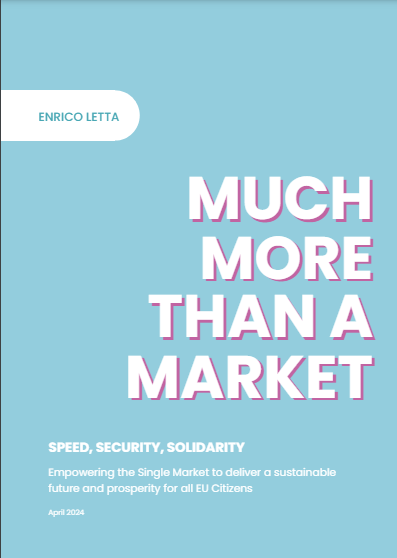Letta Report Reaction: An Encouraging Approach for Stronger Social Enterprises and Circular Single Market
Former Italian PM Enrico Letta’s recent report “Much More Than a Market” puts forward noteworthy proposals to shape the future EU Single Market. Most importantly, the report aims to be a focal point of the next EU Mandate’s agenda (2024-2029), calling for a new and comprehensive Single Market Strategy.
Letta’s report covers a vast array of topics and ideas for reform, from social cohesion to green infrastructure and defence policy. It especially presents several important points concerning social economy enterprises and creating a Circular Single Market to place circularity principles at the EU economy’s heart. This report should serve as a tool to guarantee that any future Single Market reform comes with strong guarantees to linking the social and circular policy agendas, including by upscaling, rather than hindering, the impactful work of inclusive and local actors like reuse, repair, and recycling social enterprises.
Below are the main points of reflection.

“SOCIAL ENTERPRISES ON AN EQUAL FOOTING WITH MORE MAINSTREAM COMPETITORS”
The Single Market report rightfully acknowledges the pivotal role of social economy enterprises in fostering proximity and sustainable development. Deemed as “embodying the essence of a people-centred economy rooted in local communities”, Letta states that deepening the Single Market to match global challenges must not come at the expense of social enterprises and their social and environmental missions.
On the contrary, the report states that social enterprises should participate in the Single market on an equal footing with mainstream competitors, calling on the right supportive environment to safeguard their role in strengthening the Single Market’s social dimension and job creation. For this to happen, Letta echoes the dispositions of the 2023 Council Recommendation on Social Economy Frameworks as an important starting point for future actions. Several policy measures are considered, including developing an EU-wide approach and definition of social impact financing, labels and financial instruments to attract private investments.
The Single Market report also suggests several state aid reforms. Letta calls on facilitating social enterprises’ access to finance via the adaptation of the General Block Exemption Regulation (GBER) for more adequate aid and better rules to support disadvantaged workers’ recruitment. Additionally, he calls on the introduction of state aid conditionalities, such as for the benefit of the environment and workers, to be enforced by all Member States.
Another effort to match public funds with policy objectives is the proposal for an Action Plan for High-Quality Services of General Interest (SGIs). Social enterprises active in reuse, repair, and recycling are important SGI providers. Yet, national authorities are often reluctant to release higher aid amounts designed for their support, often opting for lower amounts, if any. The Action Plan proposal should thus be designed to address legal uncertainty and better enforcement of state aid tools, including ensuring social enterprises’ SGIs like work integration and environmental protection receive adequate support.
“CIRCULAR ECONOMY IS THE ONLY POSSIBILITY OF SAVING THE PLANET”
Letta calls on the European Union to create a Circular Single Market to embed the circular economy principles within the Single Market. This would be powered by funds such as the EU Innovation Fund and the European Investment Bank’s programs to enable large-scale investments. However, the different chapters seem to indicate a business-as-usual overarching vision to foster recycling to boost competitiveness, at a time when reuse and preparation for reuse are still underrepresented in EU-level strategies.
Regrettably, there is a lack of any references to the role of reuse and preparation for reuse activities despite being more circular and carrying great potential for social employment. This feels like a missed opportunity to refer to the EU Waste Hierarchy as the beating heart of any future Circular Single Market, where circular activities are prioritised based on scientific evidence and higher recognition is given to actors intrinsically linking both social and circular goals.
The report further calls on EU-level end-of-waste (EoW) criteria to reinforce legal certainty and foster investments and innovation. As the largest network of reuse, repair, and recycling social enterprises, it remains crucial that EoW criteria are used to guarantee social enterprises’ access to waste streams and maximise local reuse by harmonising sorting requirements. Similarly, Letta calls on the harmonisation of waste, by-products, and waste shipment classifications.
“PUBLIC PROCUREMENT IS A KEY POLICY FOR THE PROMOTION OF SOCIAL ENTERPRISES”
The Single Market report specifically acknowledges public procurement as a key policy to promote social enterprises. Letta calls on a more accelerated rollout of the 2021 Social Economy Action Plan with a strong focus on the strategic use of public procurement for their support. As most recently shown by the RREUSE research report, several best practices already demonstrate how public procurement can play a bigger role in matching social and circular public objectives with guaranteeing social enterprises’ access to public contracts.
The Single Market report does a good job of highlighting the current EU public procurement shortcomings. For instance, it rightfully reflects how the predominant practice of awarding contracts primarily based on the lowest bid is not conducive to quality and discourages local and SME actors from competing.
Given the current national-level discrepancy, the report suggests considering a Regulation-based EU procurement framework. Letta also highlights the need for simplification, better SME participation, improving data and clarifying the focus of public procurement goals. Accordingly, the report calls on ensuring that public procurement prioritises social and environmental considerations on an equal footing with other criteria.
When discussing a circular economy, public procurement is again rightfully seen as key to driving higher demand for circular materials, products, and services. This is a welcome element, yet, it remains crucial that public procurement jointly integrates social and environmental considerations wherever appropriate, to advance a fair and just green transition and adapt to the characteristics of intrinsically social and circular actors like the social enterprises of the RREUSE Network.
For questions, please contact Simone Schirru, RREUSE Policy Officer in Social and Economic Policies, simone.schirru@rreuse.org

